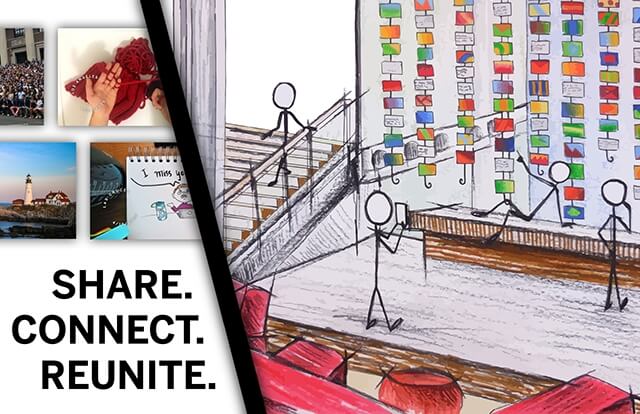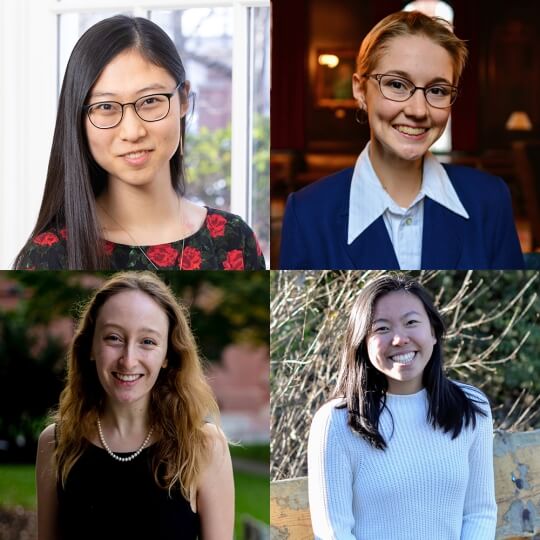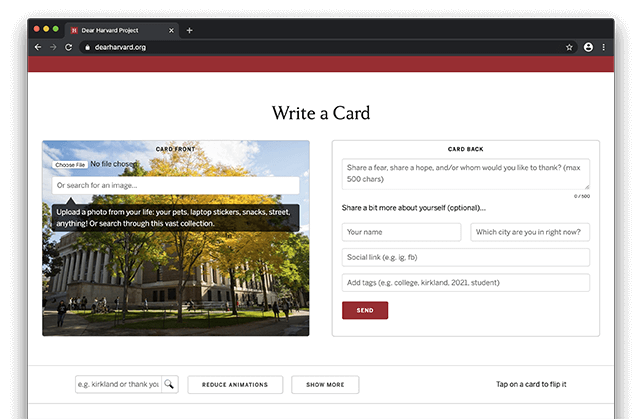News
Four undergraduate students launched Dear Harvard to enable individuals to create and send virtual postcards to connect with the Harvard community. (Image courtesy of Dear Harvard)
In the days and weeks following Harvard University’s decision to send students home for the rest of the spring term, it seemed to Katherine Lou and her friends that nearly every email they received in their school inboxes contained another blow to their spirits.
“We were really frustrated that the phrase, ‘dear members of the Harvard community,’ had almost become a preamble for bad news. It seemed like the only thing connecting people across Harvard were these bad news emails,” said Lou, A.B. ’21, a sociology concentrator pursuing a computer science secondary at the John A. Paulson School of Engineering and Applied Sciences. “So we were really interested in finding innovative ways to build community right now, and in the future.”
So Lou, Lara Teich, A.B. '21, a government concentrator, Sophie Webster, A.B. '21, an integrative biology concentrator, and Vicky Xu, A.B. ’20, an applied math concentrator, launched Dear Harvard, a website that enables members of the Harvard community to create and share virtual postcards.
To create a card, users either upload an image or browse the Dear Harvard photo library and then type a short message (500 characters or less) that is inscribed on the card’s back. They can also sign the postcard, add tags and social media links, and include their current location.
Messages can take any form—an emotional reflection on pandemic life, a funny anecdote about social distancing, or words of gratitude for the essential workers who are taking on extra risks to keep everyone safe.
The Dear Harvard team (clockwise from upper left) Katherine Lou, Lara Teich, Vicky Xu, and Sophie Webster (Images courtesy of Dear Harvard)
Users can browse the constantly expanding gallery of postcards on the Dear Harvard website (clicking on a card flips it over), but Lou and her peers also intend to use this project to bridge digital and physical Harvard spaces.
In collaboration with Harvard Common Spaces, they are planning to set up digital screens facing out from windows in some campus buildings so passersby can see the postcards and their messages of hope and encouragement. The students are also planning to print the postcards and create a physical display when students, faculty, and staff eventually return to campus.
“We want people to imagine a future when this crisis is over. We want them to imagine being back in the Smith Campus Center and being with other people again,” Lou said. “And at that time, it will be powerful to have a physical reminder of when we were separated, not just immediately after the crisis, but also so in future years we can look back and remember this time.”
Their biggest challenge so far is ensuring that Dear Harvard doesn’t grow too big, too fast, Lou said.
The project could be scaled up and spread to other institutions, but Lou and her peers want to first ensure they have a solid foundation and the right partners at Harvard to make it as successful as it can be.
They are excited to watch the project evolve as more people share postcards. As someone who is passionate about using technology to build meaningful human experiences, Lou said working on Dear Harvard has been a gratifying way to give back during a lonely and stressful time.
“We want to enable each person to contribute to something greater than themselves,” she said. “We hope this is something that is hopeful and positive, and makes people feel connected to Harvard and the broader Harvard community. While we’re not trying to prescribe any reactions or emotions, we hope this has some meaning or sentiment, and some power, for the people who participate.”
By giving members of the Harvard community the opportunity to share digital postcards, the Dear Harvard team wants to provide a hopeful and positive experience. (Image provided by Dear Harvard)
Topics: Computer Science
Cutting-edge science delivered direct to your inbox.
Join the Harvard SEAS mailing list.
Press Contact
Adam Zewe | 617-496-5878 | azewe@seas.harvard.edu





